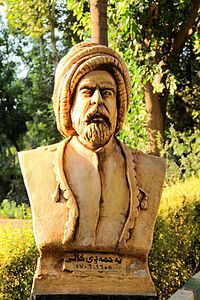This is an old revision of this page, as edited by Semsûrî (talk | contribs) at 10:13, 1 May 2021 (+). The present address (URL) is a permanent link to this revision, which may differ significantly from the current revision.
Revision as of 10:13, 1 May 2021 by Semsûrî (talk | contribs) (+)(diff) ← Previous revision | Latest revision (diff) | Newer revision → (diff) Kurdish intellectual, nationalist (1650-1707) For the village in Iran, see Ahmad Khani, Iran.
| Ahmad Khani | |
|---|---|
 A bust of Ahmad Khani in Kurdistan Region A bust of Ahmad Khani in Kurdistan Region | |
| Born | 1650 Hakkari |
| Died | 1707 (Bayazid) |
| Occupation(s) | Intellectual, scholar, poet, writer |
| Years active | 17th century |
| Academic background | |
| Influences | Melayê Cizîrî, Ali Hariri, Feqiyê Teyran |
| Academic work | |
| Influenced | Abdurrahman Sharafkandi, Haji Qadir Koyi, Hemin Mukriyani |
Ahmad Khani (Template:Lang-ku; 1650, Hakkari – 1707, Bayazid), was a Kurdish intellectual, scholar, mystic and poet who is considered the founder of Kurdish nationalism. He was born in the Hakkâri region in 1650 and died in Bayazid in 1707.
The most important work of Khani is Mem and Zin which is considered the national epic of Kurds. Other important works include Nûbiharan Biçûkan and Eqîdeya Îmanê. These works were studied in Kurdish schools from the time of Kani towards the 1930s.
Khani admired Melayê Cizîrî and Feqiyê Teyran. Joyce Blau called him the spiritual son of Cizîrî, Teyran and Ali Hariri.
Biography
Khani was born in the village of Khan near Hakkari in 1650.
Nationalism
Khani is considered the founder of Kurdish nationalism and supported an independent Kurdistan. In a mathnawi from 1694, he chose not to devote parts of the introduction to praise the rulers of his time, which was typical in classical Oriental literature. Instead, the preface of the mathnawi was dedicated to his opinions on Kurdish nationalism. He explained the subjugation of Kurds by the Ottomans and the Safavids, their occupation of Kurdistan which he argued had become a reality because of the lack of a Kurdish monarch who could rule Kurdistan. Such a ruler could liberate Kurds from the 'vile'. He also believed that an independent Kurdistan could safeguard the Kurdish language for scientific and intellectual purposes.
In the epic Mem and Zin, he writes:
If we had unity amongst ourselves,
If we all, together, obeyed one another,
The Turks, the Arabs and the Persians,
Would one and all be in our servitude,
Works
- Mem û Zîn (Mem and Zin)
- Eqîdeya Îmanê (The Path of Faith)
- Eqîdeya Îslamê (Basics of Islam)
- Nûbihara Biçûkan (The Spring of Children)
- Erdê Xweda (Astronomy and Geography book)
- Dîwana Helbestan
References
- ^ Shakely, F. (2002). "AḤMAD-E ḴĀNI". Encyclopedia Iranica.
- Ahmadzadeh, Hashem (2018). Gunter, Michael M. (ed.). Classical and modern Kurdish literature. Routledge. p. 92. ISBN 9781317237983.
- Blau, Joyce (1995). Malmîsanij (ed.). "Jiyan û berhemên Ehmedê Xanî (1650-1707)". Çira (in Kurdish): 7.
- Korangy, Alireza (2020). Kurdish Art and Identity: Verbal Art, Self-definition and Recent History. Walter de Gruyter GmbH & Co KG. p. 41. ISBN 9783110599626.
- ^ Olson, Robert. "Kurds". The Oxford Encyclopedia of the Islamic World. Retrieved 30 April 2021.
{{cite web}}: CS1 maint: url-status (link)
External links
- Works by Ehmedê Xanî at LibriVox (public domain audiobooks)

- Ahmad Khani, Kurdish Academy of Language KAL
- Our Trouble by Ehmedê Xanî, Noahs Ark Holidays
| Kurdish literature | |
|---|---|
| Texts |
|
| Before and in 1400s |
|
| 1500s-1600s |
|
| 1700s |
|
| 1800s |
|
| Contemporary |
|
| Related topics | |
| Muslim historians | |||||||||||||||||||||||||||||||||||||||||||||||||||||||||||||||||||||||||||||||||||||
|---|---|---|---|---|---|---|---|---|---|---|---|---|---|---|---|---|---|---|---|---|---|---|---|---|---|---|---|---|---|---|---|---|---|---|---|---|---|---|---|---|---|---|---|---|---|---|---|---|---|---|---|---|---|---|---|---|---|---|---|---|---|---|---|---|---|---|---|---|---|---|---|---|---|---|---|---|---|---|---|---|---|---|---|---|---|
| Historians |
| ||||||||||||||||||||||||||||||||||||||||||||||||||||||||||||||||||||||||||||||||||||
| Notable works |
| ||||||||||||||||||||||||||||||||||||||||||||||||||||||||||||||||||||||||||||||||||||
| Concepts | |||||||||||||||||||||||||||||||||||||||||||||||||||||||||||||||||||||||||||||||||||||
This article about a Kurdish poet is a stub. You can help Misplaced Pages by expanding it. |
- Kurdish poets
- Kurdish-language poets
- Kurdish-language writers
- Kurdish scholars
- Kurdish philosophers
- Kurdish scientists
- Kurdish historians
- Kurdish people of the Ottoman Empire
- 1650 births
- 1707 deaths
- Lexicographers
- People from Hakkâri Province
- 17th-century Kurdish people
- 18th-century Kurdish people
- Kurdish people stubs
- Middle Eastern poet stubs
- Kurdish nationalists